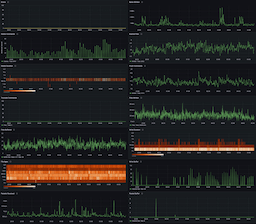This app listens on a UDP port. Parses packets with a specific format. Buffers the packet payloads and writes them to disk.
Allows us to efficiently transport logs out of the PHP app and directly to the system with the hard disk where we store log files. We use this because NFS was too slow, and we can trade a bit of reliability for faster log exfiltration.
The first line of the packet is an integer that signals how many settings to expect.
A minimum of 1 settings is required: filepath=/path
Other recognized settings are:
flush=true, truncate=true, delete=true, password=p4ssw0rd
1
filepath=/path/to/file.log
[INFO] this is a log line
2
filepath=/path/to/file.log
password=option4lPassw0rd
[INFO] this is a log line
Create a packet with echo and netcat:
echo -e "1\nfilepath=/tmp/filename.txt\nfile content goes here\nline 2 in the file" | nc -uw0 127.0.0.1 9000Has a Prometheus exporter built in with juicy metrics!

Very simple procedure we use for testing.
$socket = socket_create(AF_INET, SOCK_DGRAM, SOL_UDP);
function socket_put_contents($socket, $outputfile, $line, $host, $length = 8000)
{
if (strlen($line) > $length) {
foreach (str_split($line, $length) as $piece) {
$loggerPayload = "1\nfilepath=".$outputfile."\n".$piece;
usleep(1);
socket_sendto($socket, $loggerPayload, strlen($loggerPayload), 0, $host, 9000);
}
} else {
$loggerPayload = "1\nfilepath=" . $outputfile . "\n" . $line;
socket_sendto($socket, $loggerPayload, strlen($loggerPayload), 0, $host, 9000);
}
}We run this from a Docker container directly on a Synology NAS. Using this image:
ghcr.io/Notifiarr/fogwillow:main
Mount /config and give it a /config/fog.conf file that looks like the example. You also want to mount a place to store files, and set that to output_path in the config file.